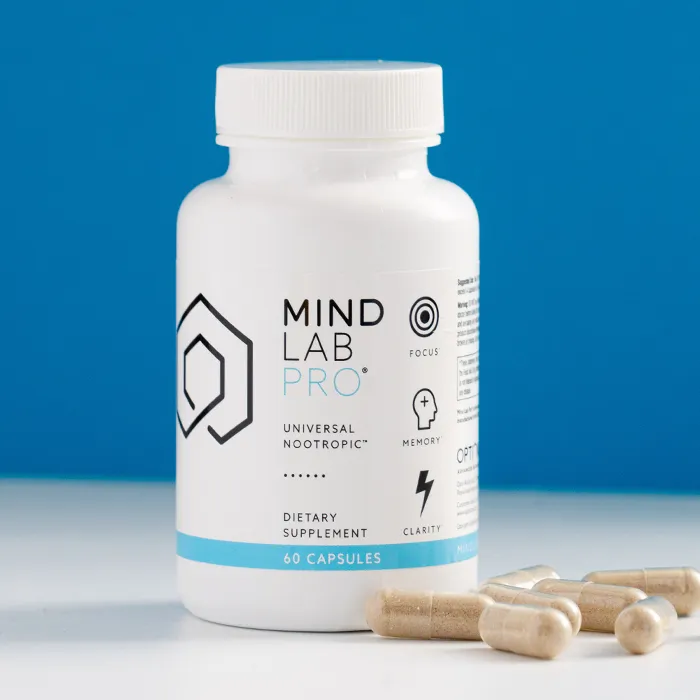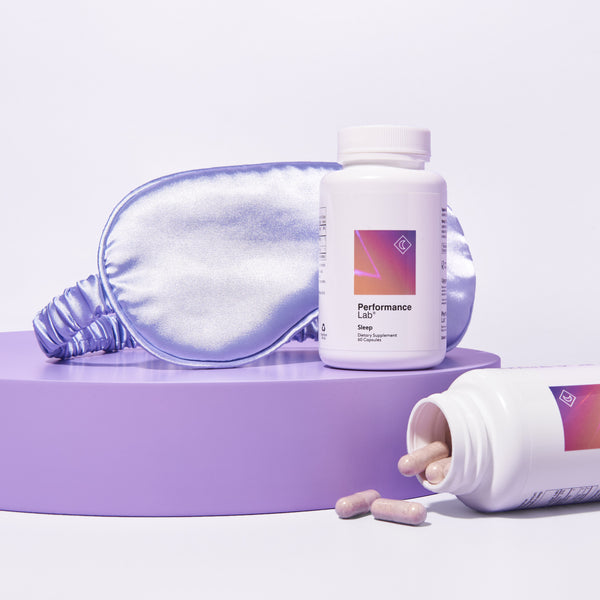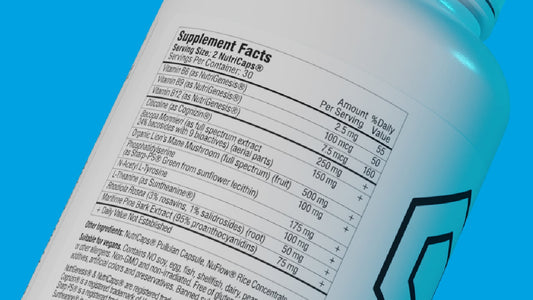Monday morning. Your alarm goes off. You hit the snooze button for the 5th time. You know you’re just delaying the inevitable.
You’ve got to get up.
But instead of feeling guilty about maximizing our Zzzz time, should we be making the most of it?
Feeling sluggish, foggy, and tired is a common complaint. 1 in 5 people suffer from sleep disorders. New parent, party animal or serial late night studier -everyone seems to be searching for a reason behind this constant fatigue. One concept that’s recently gained attention is the idea of "dirty brain water". But what exactly is dirty brain water, and how does it affect our health?
Key Takeaways
- "Dirty brain water" is a way of describing waste filled fluid that builds up in the brain when the glymphatic system does not clear toxins effectively.
- This buildup is linked with brain fog, sluggish thinking, poor mood, and may contribute over time to more serious neurodegenerative changes.
- Deep sleep, regular movement, hydration, and managing inflammation are key lifestyle levers for supporting healthy brain waste clearance.
- Targeted brain supplements can complement these habits by supporting circulation, antioxidant defenses, and the cellular health of neurons.

What is Dirty Brain Water?
Dirty brain water is a term that’s hit our feeds on social media platforms like TikTok. The gist of it is that your brain is surrounded by liquid, and when you sleep your brain sucks that liquid in through its pores and then cleans the liquid and releases it again. So if you struggle to sleep, that late night cleaning doesn't happen - and your brain is sitting in "dirty water".
Brainwashing.
Our brains float in cerebrospinal fluid (CSF). During the day toxins can build up and contaminate the fluid. During sleep, a process happens that clears out these toxins. If we don’t get enough sleep, that detox doesn’t happen. And that’s thought to be the reason why we experience symptoms like brain fog, fatigue, and crankiness.
Our brain has its own sewage system, the glymphatic system.
The Glymphatic System: The Brain's Waste Disposal System
If you compare it to a sewage system, it’s not a big leap to understanding how important this process is. Imagine if the sewage services to your home weren’t cleaning out as regularly as they should… Or perhaps don’t - it’s not a pleasant image. But you get the picture.
The glymphatic system is a relatively recent discovery, and it’s responsible for the waste management and clearance of toxins. This system consists of a network of tubes that carry fresh cerebrospinal fluid (CSF) into the brain, mix it with waste-filled fluid surrounding the brain cells, and then flush the mixture out of the brain and into the bloodstream. This waste management system is particularly active during deep sleep.
Sleep. It’s housekeeping for the head.
Similar to flushing your toilet - the brain "cleans" itself by flushing out toxins and waste products.
An under-functioning glymphatic system has been associated with degeneration of the brain and could be linked to disorders like Alzheimer's.
Cerebrospinal Fluid: The Key to Understanding Dirty Brain Water
Cerebrospinal fluid (CSF) is a clear, colorless fluid that surrounds the brain and spinal cord, providing crucial support and protection. It’s the primary component of the glymphatic system and plays a vital role in maintaining the brain's health.
During sleep, CSF washes in and out of the brain in waves, helping to clear out waste products and toxins. This process of waste removal involves the synchronization of brainwaves, blood flow, and CSF pulsations, which work together to flush out potentially harmful substances.
However, when we don’t get enough quality sleep, this cleaning process may be disrupted, leading to the accumulation of waste products and toxins in the brain – the so-called "dirty brain water."
The Impact of Dirty Brain Water on Our Health
We always knew that sleep was important. But discovering this nocturnal cleaning routine highlights how important it is for our overall health. The presence of waste products and toxins in the brain may contribute to several issues, including:
1. Fatigue and Brain Fog
If the brain's glymphatic system is unable to effectively remove waste products during sleep, these toxins can accumulate and cause feelings of fatigue, brain fog, and crankiness.
2. Sleep Quality
Poor sleep quality can have a direct impact on the effectiveness of the glymphatic system, leading to a buildup of dirty brain water. In turn, this can further disrupt sleep patterns and contribute to a vicious cycle of poor sleep and impaired brain function.
3. Cognitive Decline and Neurodegenerative Diseases
An inefficient glymphatic system and the accumulation of waste products in the brain have been linked to neurodegenerative diseases like Alzheimer's. The build-up of toxic proteins like beta-amyloid and tau, which are thought to play a role in Alzheimer's, may be due to a compromised waste clearance system in the brain. Studies show that even one night of sleep deprivation can increase the amount of beta-amyloid in the brain.
4. Immune System Function
The glymphatic system is closely connected to the immune system, and an accumulation of dirty brain water could have implications for our body's ability to ward off infections and maintain overall health.
The Role of the Subarachnoid Lymphatic-like Membrane (SLYM)
A recently discovered anatomical structure called the subarachnoid lymphatic-like membrane (SLYM) plays a crucial role in the brain's waste disposal system. This extremely thin membrane encases the brain, separating the fresh CSF from the waste-containing fluid.
The SLYM is essential for maintaining the proper functioning of the glymphatic system, as it helps to ensure that waste products are effectively removed from the brain. The presence of immune cells within the SLYM also suggests that it may play a role in detecting signs of infection in the CSF, further highlighting its importance in maintaining brain health.
How does sleep affect brain health?
- Solidifies memories: Sleep prepares your brain so it’s ready to soak up new information. It’s like hitting the ‘Save As’ button on those memories from the day. It takes the information, processes it and then moves it from the short-term memory folder to the more secure long-term archive.
- Emotional therapy: REM sleep is the stage associated with dreaming. Dreaming is the only time when our brain is completely devoid of the stress-related molecule called noradrenaline. When we dream, we’re able to reactivate emotional memories that may have been upsetting or stressful and process them in a stress-free environment.
- Creativity: During dream state, your brain interconnects huge amounts of acquired knowledge. Dreaming picks out any common themes and overarching rules allowing you to wake with a clearer understanding and new fresh thinking.
- Regulates appetite: Ghrelin and leptin are two key hormones involved in appetite regulation. Ghrelin stimulates hunger, while leptin signals fullness and reduces appetite. Sleep deprivation or inadequate sleep can disrupt the normal balance of these hormones. It can increase ghrelin levels leaving you feeling hungry.
- Cognitive function and performance: Sleep is crucial for optimal cognitive function. It improves attention, concentration, problem-solving skills, creativity, and decision-making abilities. On the other hand, sleep deprivation impairs cognitive performance, leading to difficulties in learning, memory retrieval, and overall mental clarity.
How to Improve Brain Health and Prevent Dirty Brain Water
Now that we understand the potential implications of dirty brain water on our health, the bottom line seems to be get more sleep. Quality sleep is essential for the proper functioning of the brain’s glymphatic system and the prevention of dirty brain water. Aim for 7-9 hours of uninterrupted sleep each night and establish a consistent sleep schedule to support your body's natural rhythms.
Good sleep hygiene practices
Stick to a consistent sleep schedule.
Set a regular sleep schedule by going to bed and waking up at the same time every day, even on weekends. This helps regulate your body's internal clock and promotes better sleep quality.
Create a sleep-friendly environment.
Make your bedroom a comfortable and relaxing sleep environment. Ensure your mattress, pillows, and bedding are comfortable and supportive. Keep the room dark, quiet, and at a cool temperature. Consider using earplugs, eye shades, or white noise if needed.
Establish a bedtime routine.
Develop a relaxing routine before bed to signal to your body that it's time to sleep. This can include activities such as reading a book, taking a warm bath, practicing relaxation exercises, or listening to calming music. Avoid stimulating activities, bright screens, and electronic devices close to bedtime.
Limit exposure to blue light.
The blue light emitted by electronic devices such as smartphones, tablets, and computers can interfere with your sleep-wake cycle. Avoid using electronic devices for at least an hour before bed or use blue light filters or apps that reduce blue light emission.
Manage stress and anxiety.
High levels of stress and anxiety can disrupt sleep. Practice stress management techniques such as deep breathing, meditation, or journaling before bed to help calm your mind and promote relaxation.
Limit caffeine and alcohol intake.
Avoid consuming caffeine. Similarly, although alcohol may initially make you feel sleepy, it can disrupt the quality of your sleep later in the night.
Exercise regularly.
Engaging in regular physical activity during the day can help promote better sleep. However, avoid intense exercise close to bedtime as it may stimulate your body and make it difficult to fall asleep. Aim to finish exercising at least a few hours before bedtime.
Avoid large meals and fluids.
Eating a heavy meal or consuming a lot of fluids close to bedtime can cause discomfort, indigestion, and the need to wake up for bathroom trips during the night.
Final Thoughts
The idea of dirty brain water captures the imagination and highlights the essential role of sleep in maintaining brain health. With research suggesting that 1 in 5 people are living with a sleep disorder. It’s not surprising that many of us routinely wake up with foggy heads and grouchy moods.
If you’re one of those people who struggles to get a solid 8 hours, and gets frustrated at the implication there's a choice in how much sleep you get, a sleep supplement is something to explore.
The problem here is that some sleep supplements on the market can leave you feeling groggy when you wake. So groggy, that there's hardly any difference between how you feel on a night you take it, and how you feel on night you sleep badly. If this is something you've encountered, there is another option.

















